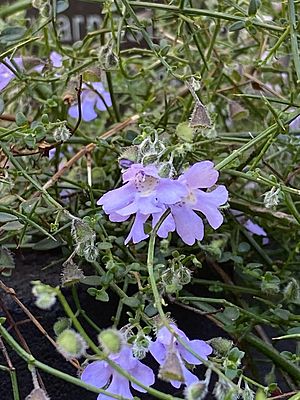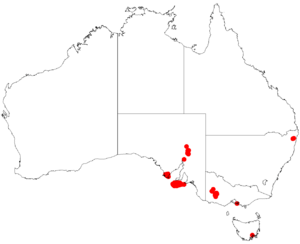Spiny mintbush facts for kids
Prostanthera spinosa, also known as spiny mintbush, is a special kind of shrub that grows only in south-eastern Australia. It has pretty flowers that can be purple or white, stems that feel a bit spiky, and leaves that smell nice.
Quick facts for kids Spiny mintbush |
|
|---|---|
 |
|
| Prostanthera spinosa ANBG Canberra | |
| Scientific classification |
|
| Kingdom: | Plantae |
| Clade: | Tracheophytes |
| Clade: | Angiosperms |
| Clade: | Eudicots |
| Clade: | Asterids |
| Order: | Lamiales |
| Family: | Lamiaceae |
| Genus: | Prostanthera |
| Species: |
P. spinosa
|
| Binomial name | |
| Prostanthera spinosa |
|
 |
|
| Occurrence data from AVH | |
| Script error: The function "autoWithCaption" does not exist. | |
Script error: No such module "Check for conflicting parameters".
Contents
What Does Spiny Mintbush Look Like?
The spiny mintbush is a small, tough shrub. It usually grows to be about 0.2–2 m (7.9 in – 6 ft 6.7 in) tall. Its branches often spread out or lie close to the ground.
Branches and Spines
The branches of the spiny mintbush have a nice smell. They can be a bit hairy or smooth. They also have small spines, which are like tiny thorns, about 6–16 mm (0.24–0.63 in) long. These spines grow in pairs, one opposite the other.
Leaves and Flowers
The leaves are small and can be hairy or mostly smooth. They are shaped like a narrow egg or a wide oval. Each leaf is about 1.5–6 mm (0.059–0.236 in) long and 1–3 mm (0.039–0.118 in) wide. The top of the leaf is darker than the bottom. You can also see tiny glands all over the leaves.
The flowers grow one by one where the leaves meet the stem. They are usually pale purple, lilac, or white. Inside the lower petal, you might see orange-brown lines or spots. The flowers bloom from July to December.
How Was Spiny Mintbush Named?
The spiny mintbush was first officially described in 1855. A botanist named Ferdinand von Mueller gave it its scientific name. He found the plant growing on rocky slopes near springs in a place called the Grampians National Park.
The second part of its scientific name, spinosa, comes from a Latin word. It means "thorny" or "spiny," which makes sense because of its spiny stems!
Where Does Spiny Mintbush Grow?
You can find the spiny mintbush in the Grampian Mountains in Australia. It likes rocky areas with shallow, sandy soil. In South Australia, it often grows near rivers or streams. There, it prefers sandy soil over limestone or sandstone rocks.
 | Calvin Brent |
 | Walter T. Bailey |
 | Martha Cassell Thompson |
 | Alberta Jeannette Cassell |

